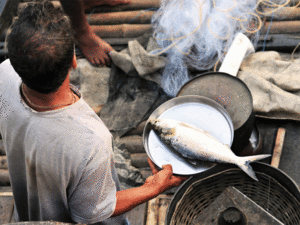
“1,000 tonnes of Hilsa, which has been imported from Myanmar, are lying at the wholesale markets,” Syed Anawar Maqsood, secretary at West Bengal Fish Importers Association, told ET. “No other state except West Bengal imports hilsa fish from Myanmar.”
Maqsood said there is huge demand for hilsa not only in Bengal but in other parts of India also like Delhi, Assam, Gujarat and Maharashtra, which is why hilsa is imported.
“We had placed the orders for hilsa before the lockdown. Now, they have arrived at the wholesale markets. But there are no buyers because nobody is ready to pay the price for hilsa. People are preferring fishes that are low priced. They are not keen to spend more,” he said.
While hilsa is not finding its place on the platter of the fish lovers, a new variety of fish—white dotted gizzard—is being imported from Oman, the UAE and Vietnam to cater to the fish eaters. It is being called as poor man’s hilsa and the price is much lower than the original hilsa. Price of a 500 gm white dotted gizzard fish is Rs 210 only. “This fish is gaining popularity in Bengal and Tripura,” a fish trader said.
Suppliers of hilsa to markets in Delhi and Mumbai are not keen to buy the fish.
“We are not purchasing hilsa from the importers in West Bengal as we are not sure whether they will be sold,” said Dipankar Roy, owner of Bengali Fish Corner in Dwarka in Delhi. “People are preferring rohu and katla fishes, which are priced between Rs 300 and Rs 400 a kg. Middle-class people are not eager to pay more. Even they are avoiding bekti fish, which are commanding a price of Rs 600-700 per kg.”
Tarak Das, a fish seller in Vashi in Navi Mumbai, said that most of the fish sellers have not bought hilsa fish because they are not sure whether there will be buyers. “People are cutting down on their daily food budgets due to the uncertainty. Who will now splurge on hilsa fish?” he asked.
Last year, patchy rains had resulted in a big shortage of good quality freshwater hilsa fish. Supplies of the fish prized for its flavour have hit a five-year low. The demand for the fish in the market was met through frozen varieties imported from Myanmar, not fresh catch from Bengal.
Maqsood is, however, hopeful that hilsa fish will start moving once the lockdown is withdrawn and normalcy returns. “It may take another month. But we will be able to sell them,” he said.
Download The Economic Times News App to get Daily Market Updates & Live Business News.
Download The Economic Times News App to get Daily Market Updates & Live Business News.









 Get Unlimited Access to The Economic Times
Get Unlimited Access to The Economic Times
